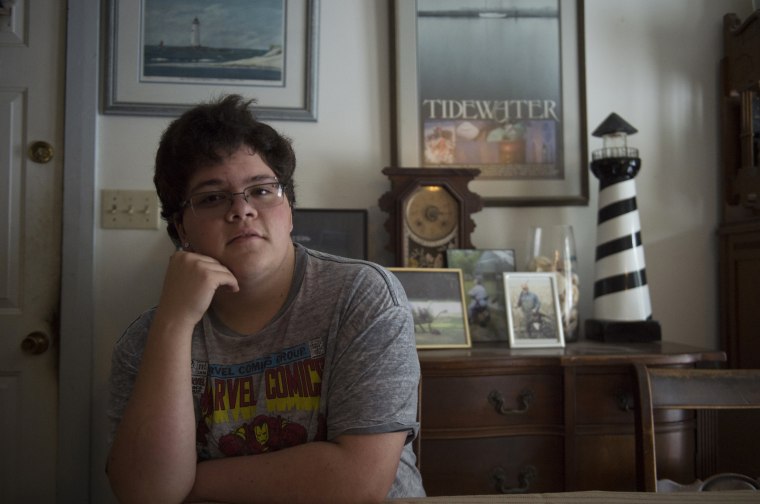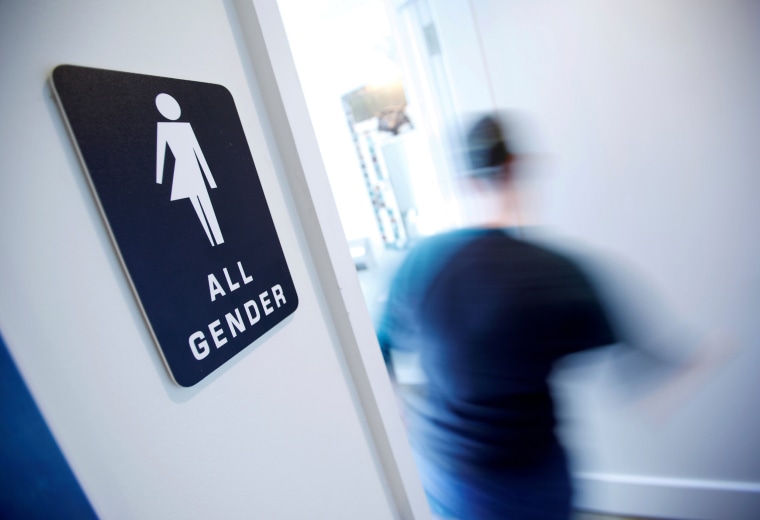Ellie is a typical 15-year-old girl. She’s just starting high school in her rural Pacific Northwest town, where the entire freshman class is only about 30 students. At school, she and her friends chat in the girls' bathroom like all teen girls do, and when she’s at home, she talks with her friends online.
Ellie is not transgender. But if she were subjected to a school policy that mandated students use the restroom that matched their biological sex at birth, Ellie might be forced to use a bathroom with the boys at her school. That’s because she’s genetically “male.”
Just about a year ago, Ellie’s mom (who asked that her last name not be published) took her to the doctor to find out why she wasn’t experiencing certain symptoms of puberty. That’s when the family found out that Ellie is intersex; she was born with Swyer Syndrome, which means she has XY chromosomes like those typically found in boys. Girls with Swyer Syndrome have unformed sex glands where other girls have ovaries; they need hormone replacement in order to encourage puberty and usually cannot become pregnant without an egg donor.
Swyer Syndrome is rare, but it's the same condition that Sara Kelly Keenan — who received the nation's first known intersex birth certificate in December — was born with.
“I’ve been lucky because my intersex condition doesn’t impact my outward physical traits,” Ellie told NBC News. “I’ve never experienced direct discrimination in bathrooms or in school. I would have to explain to someone my internal anatomy for someone to understand.”

Ellie has been a girl her entire life, but now she identifies as intersex in addition to female. She spoke with NBC News the day before dozens of amicus briefs were filed to the Supreme Court in support of Gavin Grimm, a Virginia transgender boy whose fight to use the boys restroom at school climbed to the nation’s highest court over the past two years. Grimm’s case will decide for the nation whether Title IX — the landmark law banning sex discrimination in schools — includes gender identity in its definition of "sex."
In addition to briefs from Congress, mayors, major corporations, clergy and more, InterACT, a group that advocates for the rights of children born with intersex traits, filed a brief on Thursday. It tells the court that intersex kids are living proof that the concept of physiological sex is not “binary, objective, and self-evident” any more than is gender identity.
“The fact that intersex students exist belies [the] assumption that construing ‘sex’ solely on a ‘physiological’ basis would prevent students from sharing a restroom with others whose sex characteristics differ from their own,” reads the brief.
Even if school policies were designed to mandate that kids only use locker rooms and restrooms that match the gender on their birth certificates, argues the InterACT brief, “students could not be sure that the person in the next stall has genitals, gonads, or sex chromosomes identical to theirs.”
The brief quotes endocrinologists and other doctors who explain that the concept of biological sex isn’t based on any one simple thing, but is an often unique mixture of “external genitalia, internal sex organs, hormones, or chromosomes.” Some of those factors change during our lifetimes for non-intersex people, too—a woman may experience radical shifts in testosterone and estrogen levels during menopause, for example.
“A bill segregating folks based on biological sex inadvertently targets and demeans those born with intersex traits."
Because of the way the lived biological realities of intersex people contradict our traditional understanding of gender and physiology, the intersex community is poised to throw a wrench in the argument that facilities should be segregated according to “biological” sex rather than gender identity.
The number of intersex people is roughly equivalent to the number of natural redheads (about 2 percent of the population), although exact data is impossible due to the number of people who remain closeted and parents who never inform their children they were born intersex. Many babies born with intersex traits are subjected to immediate surgeries, and many intersex people do not discover they are intersex until later in life.
“A person may not even become aware that they were born with an intersex trait until adulthood,” said Alesdair Ittelson, Deputy Legal Director at InterACT. “Some people may never know, which also clarifies how untenable a biological sex-segregation policy is.”
Ittelson said InterACT’s youth program includes young people up to age 29, because so many don’t discover they are intersex until their teens or 20s. The group’s members come from a wide range of backgrounds, with a variety of medical differences ranging from Swyer Syndrome to Androgen Insensitivity Syndrome (AIS) and a dozen or so similar conditions that alter sex characteristics.

The group also recently partnered with fashion model Hanne Gaby Odiele, who came out as intersex and immediately became the community’s most famous representative.
According to Ittelson, the intersex youth that work with InterACT have been upset by the recent wave of “bathroom bills” and the news that the Trump administration withdrew guidance designed to protect the rights of transgender students.
“A bill segregating folks based on biological sex inadvertently targets and demeans those born with intersex traits as well,” Ittelson said, noting that intersex youth are frequently not even considered in regards to such legislation because “there’s still such shame and stigma around these conditions.”
InterACT leapt at the chance to make a statement in the Grimm case because “we have a shared interest in bodily autonomy and being able to say what happens to our bodies.”
When Ellie, the 15-year-old intersex high school student, talks about the upcoming Supreme Court case, she calls Gavin Grimm “our friend.”
Ellie says the people around her take for granted that she’s a girl. No one ever asks her what her chromosomes are like, whether she’s got XX or XY (she has the latter). But she knows it's different for kids like Grimm.
“I’ve never experienced direct discrimination in bathrooms or in school. I would have to explain to someone my internal anatomy for someone to understand,” Ellie told NBC News. “But for Gavin and other trans students, who need to safely access bathrooms, they’re being hurt by this bill.”
Both Ellie and Ittelson pointed out that transgender and intersex people have a sort of inverse, yet similar, experience when it comes to gender-related medical care. Intersex people are frequently given unnecessary surgeries or hormone treatments — before they are old enough to consent — to correct sex anomalies that parents and doctors feel are wrong. In contrast, transgender people often face obstacles when trying to access hormones and surgeries to correct the gender they feel is wrong.
“In my case, it took several intensive tests just to find out that I had chromosomes that didn’t fit the ideal biology of ‘girl,’” Ellie said. "And to require that you use the bathroom of your biological sex doesn’t make sense. Because girls can have XXY or XXO or any set or pattern of hormones or organs. And we’ll never know based on their outward appearance.”
Unlike many intersex and transgender kids, Ellie has a mom who supports her decision to get the medical care needed to affirm her gender.
“Ending discrimination against trans or intersex kids doesn’t take away anyone else’s privacy or safety,” Ellie added. “Intersex and trans kids are just kids. We’re perfect the way we are, we don’t need to be fixed.”
